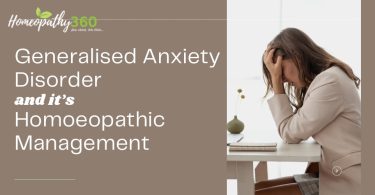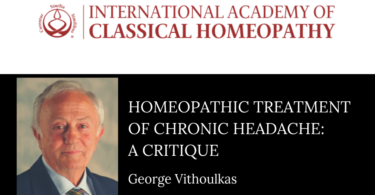
Abstract: Education is the most powerful weapon which you can use to change the world- Nelson Mandela.Learning disability/disorder in which child faces problem to enhance his capabilities. So, this is an attempt to show the effectiveness of homoeopathic medicine in learning disability/disorder.
Keywords: Learning disabilities, Specific learning disorder (SLD), dyscalculia, dysgraphia, Homoeopathy, Tuberculinum
Introduction:
Specific learning disorder (SLD) is a neurodevelopmental disorder with a biological origin that is the basis for abnormalities at a cognitive level that is associated with the behavioural signs of the disorder. The biological origin includes an interaction of genetic, epigenetic, and environmental factors, which affects the brain’s ability to perceive or process verbal or non-verbal information efficiently & accurately.[According to Diagnostic and Statistical Manual of Mental Disorders (DSM) – 5th Edition] Dyslexia, dyscalculia, dysgraphia comes under this broad heading. The prevalence of specific learning disorders in the academic domain is approximate 5-15% among school-age children.[1]
Case Definition:
A patient aged 10 years, female child approached to clinic on dated 16/09/2020 with complaints of weak memory, forgetfulness since 2 years. Forgetful in reminding things, where she put things, what has been said to her, what has been happened in school etc. Doesn’t take interest in studies with lack of concentration while studying. Weak in studies. Unable to remind mathematical tables & solve mathematical questions, spelling mistakes in both Hindi & English dictation. Took time in reading English letters along with wrong pronunciation. Failure to thrive since childhood.
Recurrent cold with watery nasal discharge- on & off since childhood. <- change of weather+2, cold air+1
Past History:
H/o Febrile seizure- 2 episodes at the age of 2 months- Continued Allopathic Rx from PGI, Chandigarh [From 2011-2016]
H/o Pneumothorax- At the age of 2 months.
Family History:
Mother- Hypothyroidism [Diagnosed during first pregnancy, took allopathic Rx]
Father- NAD
Paternal Grand Mother- Hypertensive
Paternal Grand Father- NAD
Maternal Grand Mother- NAD
Maternal Grand Father- Diabetes + Carcinoma of liver? [Death on 23/12/2019]
Life space:
Patient is the first child of her parents. Lives with joint family, has one younger brother and two cousin siblings. Attachment with her mother. Fearful towards her father because of her father’s angry nature.
Physical General:
Appetite: Decreased+2
Thirst: Thirsty, 3-4 glasses/day
Desire: Maggi+3, Pasta, Kurkure, Salty+1
Aversion: Spicy+2
Thermals: Hot +1
Perspiration: Normal, over whole body.
Sleep: Sleeps late at night & wakes late in the morning. Disturbed
Dreams: N/S
Stool: Satisfactory, pass once-twice daily, occasionally constipated.
Urine: NAD, D8-9 N0-1
Mental generals: Naughty+2, Obstinate +2, Hyperactive+2, Crying & weeping only that her demands must be fullfilled. Restlessness+2, no control on hands.
Mother’s Observation: Took interest in household chores [cutting vegetables], but doesn’t take interest in studies. Forgets what she intends to speak. Angry+2 trifles about, throws things in anger. Destructive nature. Changeable moods, demands different things at a time [in few seconds]. Desire- alone+1, cycling, swinging. Gets mix up easily.
Diagnostic Criteria[1]:
| A. Difficulties learning & using academic skills, as indicated by the presence of atleast one of the following symptoms that have persisted for at least 6 months, despite the provision of interventions that target those difficulties: | |
| Inaccurate or slow and effortful word reading(e.g., reads single words aloud incorrectly or slowly and hesitantly, frequently guesses words, has difficulty sounding out words) | |
| Difficulty understanding the meaning of what is read (e.g., may read text accurately but not understand the sequence, relationships, inferences, or deeper meanings of what is read). | |
| Difficulties with spelling (e.g., may add, omit, or substitute vowels or consonants). | |
| Difficulties with written expression (e.g., makes multiple grammatical or punctuation errors with sentences; employs poor paragraph organisation; written expression of ideas lacks clarity). | |
| Difficulties mastering number sense, number facts, or calculating(e.g., has poor understanding of numbers, their magnitude and relationships; counts on fingers to add single-digit numbers instead of recalling the math fact as peer do; gets lost in the midst of arithmetic computation & may switch procedures). | |
| Difficulties with mathematical reasoning (e.g., has severe difficulty applying mathematical concepts, facts, or procedures to solve quantitative problems). |
Analysis / Evaluation of Symptoms:
| Symptom Classification[2] | Miasmatic Analysis[2] | |
| Naughty+2 | Common Mental generals | Sycosis |
| Obstinate +2 | Common Mental generals | Sycosis |
| Crying & weeping to fulfils her demands | Characteristic Mental generals(Emotional) | Psoric |
| Desire- alone+1 | Characteristic Mental generals(Emotional) | Psoric |
| Angry+2 trifles about, throws things in anger. Destructive nature | Characteristic Mental generals(Emotional) | Psoric |
| Forgetful in reminding things, where she put things, what has been said to her. | Characteristic Mental generals(Intellectual) | Sycosis |
| Weak memory. Did mistakes in mathematics, calculation, reading & writing, unable to learn. | Characteristic Mental generals(Intellectual) | Sycosis |
| Desire: Maggi+3, Salty+1, Spicy+2 Aversion to, | Characteristic Physical generals | Psoric |
| Hyperactive+2, Restlessness+2 | Characteristic Physical generals | Sycosis |
| Recurrent cold with watery nasal discharge <- change of weather+2, cold air+1 | Characteristic particulars | Psoric |
PDF:Thirsty, Thermals: Hot +1
Totality of Symptoms: Obstinate +2, Hyperactive+2, Restlessness+2 Desire- alone+1,Angry+2 trifles about, throws things in anger. Destructive nature
Reportorial Totality [3]:
Repertorial Result: Staphisagria/ Tuberculinum/ Phosphorus/ Lycopodium/ Tarentula
Remedy differentiation/Selection: As thermals of ‘Staphisagria’, ‘Phosphorus’ are towards chilly, so ruled out. The restlessness of patient doesn’t meet the extent of restlessness of ‘Tarentula’ so ruled out.
[Tuberculinum] Thirst, for larger quantities of cold water. Mentally deficient children. Lax fiber, low recuperative powers, and very susceptible to changes in the weather. Patient always tired, aversion to work; wants constant changes and cold is taken from the slightest exposure. Rapid emaciation. [4,5]
Phillip M. Bailey wrote in Homeopathic Psychology about Tuberculinum individuals that they have a kind of hunger to experience a great many things in a short period, as if time were really running out for them. They cannot bear a steady routine, unless it is packed with excitement.[6]
CHARLES EDWIN WHEELER mentions in his book ‘Introduction to the Principles & Practice of Homeopathy’ about Tuberculinum as: The appetite is capricious and there is difficulty in putting on weight. They are seldom fat, and bodily exertion easily fatigues them. But they may grow rapidly, shoot up in height without corresponding muscular development. There is extreme variability in all their symptoms. The emotional state varies and is often unbalanced: for example, there is a tendency to fits of irrational bad temper and a restless changefulness in their approach to life. There is similar variability in the physical symptoms; for example, the stools may be constipated and hard on some occasions, soft on others.[7]
He also mentions Tuberculinum should always be considered in the treatment of mentally deficient children. Where there is arrested development, mental or physical, it is a particularly valuable remedy. Many cases are recorded wherein a backward child has been stimulated to normal development following the administration of tuberculinum.[7]
Potency/Dose selection: As according to Organon of medicine, 5th edition susceptibility fall into moderate level [2], so moderate potency with frequent repetition is needed as multiple-dose stimulation should be reserved for cases in which single-dose stimulation is considered to be insufficient. And as soon as adequate response is obtained, further stimulation should be suspended.[8] So planned to give Tuberculinum 200 per dose per week.
Prescription: [16/09/2020]
Rx Tuberculinum 200/ 1 dose/HS/ weekly
Sac lac200/ TDS/ 15 day
Follow- Up:
| Date | Change in symptomatology | Prescription |
| 10/10/2020 | No marked change. Can memorize 2 events that happened at school and share them with her mother. Sleep still disturbed. No change in appetite | Rx Tuberculinum 200/ 1 dose/HS/ weekly Phytum 200/ TDS/ 4 weeks |
| 27/11/2020 | An acute episode of cold, but managed very well without allopathic Rx. Otherwise no other change in any condition. Sleep patterns slightly improved. | Rx Tuberculinum 200/ 1 dose/HS/ weekly Phytum 200/ TDS/ 4 weeks |
| 4/02/2021 | Complaints- SQ. no new complaint appears. Sleep improved, appetite- improved than previously. | Rx Tuberculinum 200/ 1 dose/HS/ weekly Phytum 200/ TDS/ 4 weeks |
| 23/04/2021 | Slight Changes in eating patterns & learning capabilities. Slight improvement in remembering things. Hyperactive- SQ [as per Mother’s observation] Lack of concentration & interest in studies- SQ Obstinacy decreased than before. Avoid learning at school, went to the washroom in every class to avoid lectures. | Rx Tuberculinum 200/ 3 dose/HS/ weekly Phytum 200/ TDS/ 6 weeks |
| F/U gap of 1 month | ||
| 07/08/2021 | Appetite improved. Improvement in taking interest in studies and concentration also improved. Can remind things now. Learning patterns improved. Mathematical questions did correctly, mistakes in spelling & writing are less. | Rx Rii 200/ 3 dose/HS/weekly Phytum 200/ TDS/ 4 weeks |
Conclusion:
Homoeopathy shows its effectiveness in managing the symptoms of learning disabilities. Homoeopathy not only helps in better academic performance but also helps in improving Quality of life.
References:
- Diagnostic and Statistical Manual of Mental Disorders (DSM-5). 5th edition. American Psychiatric Association, 2013.
- Hahnemann S. Organon of medicine. 5th edition. New Delhi: B. Jain (P) Ltd; 2016.
- RADAR 10.5 [Homopathic Computer Program]. Schroyens F. Synthesis Repertorium Homoeopathicum Syntheticum. Edition 9.0.
- Boericke OE. Boericke’s New Manual of Homoeopathic Materia Medica with Repertory. 3rd revised & augmented edition. New Delhi: B. Jain Publishers Pvt. Ltd.; 2018.
- Kent J T. Lectures on Homoeopathic Materia Medica. New Delhi: B. Jain (P) Ltd;
- Bailey PM. Homoepathic psychology. Berkeley: North Atlantic Books Homeopathic Educational Services; 1995.
- WHEELER C E. Introduction to the Principles & Practice of Homeopathy. Encyclopedia Homoeopathica [Homoeopathic software]
- Dhawale ML. Principles & Practice of Homoeopathy. Volume 1. Bombay: Karnatak publishing house. 1967. P.no- 91, 412.
DR. Sonia Tuteja, Associate Professor, Department of Materia Medica,
Swasthya Kalyan Homoeopathic Medical College and Research Centre,
Sitapura, Jaipur (Rajasthan).
Dr. Mehak, M.D. (PGR), Department of Materia Medica
Swasthya Kalyan Homoeopathic Medical College and Research Centre,
Sitapura, Jaipur (Rajasthan).





